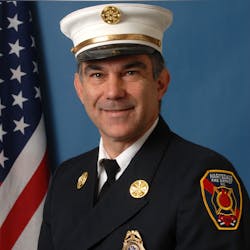First Due: The Right Way to Lead and Manage in the Fire Service
In my 46 years in the fire service, both career and volunteer, I have worked for numerous bosses who utilized different management styles. I learned from every some of them what to do and from some what not to do. This collective experience allowed me to develop my own management style, what I like to call “the right way to lead and manage in the fire service.”
Quite simply, you put the right people in the right positions with the right resources and get the f%#$ out of the way.
Star search
People are the most important asset in any organization. This can present a big challenge when you are new to your position, be it chief or company officer. Hopefully, you take over an organization that has a bunch of the “right” people, but if you don’t, your first priority must be to find them.
If you are an officer of a volunteer department, this is where the recruitment effort kicks in—as well as the retention of those right people. If you are an officer of a career department, you must look to hire the right people or look to have them transfer into your group. So, you must make your group or department desirable for the right people.
Does your organization not only preach diversity but practice it, too? As a leader, do you respect your people, encourage initiative, treat everyone fairly—not necessarily equally—and have their back at all times? Do you share your organizational values with your people and recruit people who share those values?
Egos eat brains
You don’t always need to be the smartest person in the room. As a good leader, you want to surround yourself with smart people and utilize their knowledge, skills and abilities. My department had firefighters whose education spanned everything from a GED to an Ivy League degree. Depending on the topic, any one of them might have been the smartest in the room.
As chief or company officer, you must accept that you might not be the best at everything. You should be good at everything and the best at a few things. I had people who were much better than I was at training, driving, hazmat, technical rescue, throwing ladders and stretching a line. My strength was budgeting and finance.
If you keep egos in check, you can learn from each other, so all of you advance and, in the end, the organization wins.
People & right positions
There are two parts to this. First, you match your skills to the jobs that they will perform. You don’t want to set them up to fail. Put the eggheads in charge of the computers, the tradespeople in charge of buildings and grounds and the diesel mechanic in charge of apparatus.
Second, allow those right people to grow and to diversify, and groom them to move up, to take on more responsibility and to eventually take your job. Maybe you pair the IT guru and the carpenter to work together on a project and learn each other’s functions.
We hear a lot of complaining about millennials and the alphabet generations, but they have an amazing ability to multitask, and they bring a new set of skills to the table. Give them the chance to shine, and they just might surprise you.
Of course, if you have any moms in your organization, they are superhuman and can do just about anything. Utilize them to the fullest.
Leadership as a resource
You must give your people the right resources, what they need to get their job done. I’m not just talking about apparatus, equipment, tools, supplies, etc. It’s also proper training, the ability to go to conferences, to take classes, etc. It’s the leeway to do things their own way occasionally, the ability to fail, because that’s how they will learn. (Of course, those opportunities must be selected carefully.)
The most important resource that you can provide is leadership. Don’t ever let them feel as though they are out there alone with no guidance.
One of my favorite quotes about leadership came from a good friend who is a Catholic bishop in Nigeria: “Leadership is not about power; it is about purpose.” Passing that purpose on to your people is crucial. That will give you and, thus, them the power to accomplish the tasks at hand. That really is what it all comes down to.
About the Author

Ed Rush
Ed Rush has more than 48 years in the fire service, both career and volunteer. He retired as career chief of the Hartsdale, NY, Fire Department and previously served as chief of the Elmsford, NY, Volunteer Fire Department. Rush currently volunteers with the Lewes, DE, Fire Department and Montgomery County, MD, Fire and Rescue, where he also is a Peer Support team member. He served seven years on the board of the Volunteer & Combination Officers Section of the International Association of Fire Chiefs. Rush serves on the Government Affairs Committee of the New York State Association of Fire Chiefs.
